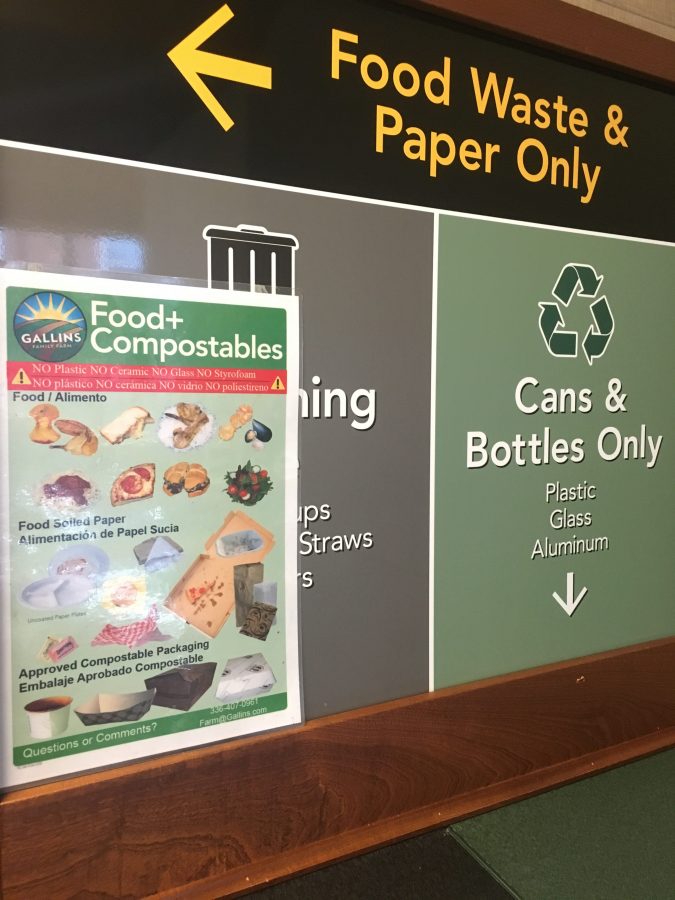A variety of initiatives have been implemented on the Wake Forest campus to reduce food waste from the dining halls and give back to the local community.
These plans are twofold but share the goal of reducing the amount of food ending up in landfills. First, partnering with Campus Kitchen gives back to the Winston-Salem community and second, partnering with Gallins Family Farms to compost gives back to the Earth.
“Inside of the Wake Forest bubble, I think it is very easy to forget that Winston-Salem is ranked 16th nationally for a number of families with children reporting food insecurity, said Morgan Briggs, procurement chair of Campus Kitchen. “Within one mile of our campus there are families who do not know where their next meal is coming from.”
According to the United States Department of Agriculture, Winston-Salem is a food desert, meaning that areas in the city are too far from grocery stores for residents to have adequate access to healthy food. Forsyth County is home to 62,590 people who are food insecure, which includes 25 percent of the county’s children.
The solution to food insecurity is not necessarily producing more food. The agriculture industry is one of the biggest producers of carbon emissions globally, contributing about nine percent of emissions. Excessive emissions are rapidly thinning the Earth’s ozone, contributing to climate change.
Although people are hungry, over one third of all food produced is never eaten. According to the Office of Sustainability, it is estimated that if more people adopt a plant-based diet, compost organic matter and reduce food waste by 50 percent, carbon emissions could be reduced by 70.53 gigatons by 2050.
The sustainable partnerships Wake Forest has cultivated require daily commitments and action over time to be effective.
Wake Forest’s dining halls are an integral part of the Wake Forest experience. The Pit, specifically, with its long tables, offers space for large groups of friends to gather between classes. The variety of buffet-style stations offer the opportunity to try new dishes and gather multiple plates of food. Students often lounge in the booths doing work, surrounded by numerous cups and plates as they attempt to multitask.
“I always incorporate the options from different stations into one meal: I’ll make a salad from the salad bar, add a fried egg from the egg line, and top it with vegetables from the vegan station,” said sophomore Sarah Elia.
The North Campus Dining Hall was built with food waste reduction in mind. A composter in the kitchen grinds all scraps and leftovers and then shoots them out a pipe to be bagged for Gallins. The Pit, however, is not equipped with the same machinery, so one of the most important steps in the process is screening the compost piles for contaminants.
“You wouldn’t believe some of the things we find in the piles,” said Pete Gallins, the owner and operator of the farm. “A huge part of the education process is getting people to understand what is and isn’t compostable.”
This composting program began in 2013. Since then, almost 400 tons of compost have been collected for Gallins in the dining halls. The finished fertilizer bagged and is sold to local farms and gardeners.
The Office of Sustainability is working to educate students more about compost and food waste reduction practices.
“Whatever a student leaves on their plate in the North Dining Hall, as long as it doesn’t have contaminants in it, can be sent out through a process to the compost bin,” said John Wise, associate vice president of hospitality and auxiliary services. “In the Pit, pre-consumer waste is composted in the same way, but where we need help from students is to minimize plate waste, because we don’t have a system in place to handle post-consumer waste yet.”
When students are mindful about how much food goes on a plate, they contribute to the prepared food that is redistributed by Campus Kitchen.
“Food is prepared in batches, but if it doesn’t go out to the line, it gets sourced to Campus Kitchen, and then to community food needs,” Wise said.
Between 2006 and 2016, Campus Kitchen redistributed almost 400,000 pounds of produce and prepared food to the community. About 35 people are fed daily through cooking shifts now, and 20 to 25 more get food through redistribution.
“[Through Campus Kitchen,] I have gained a greater understanding of the challenges faced by a community stricken by hunger,” Briggs said. “I have developed empathy for those who do not know where their next meal is coming from.”













